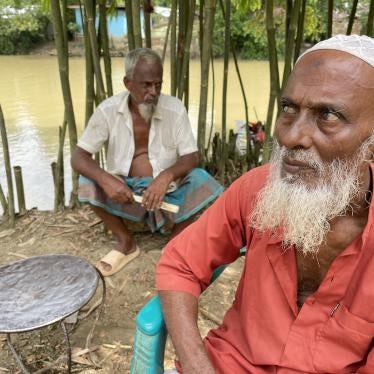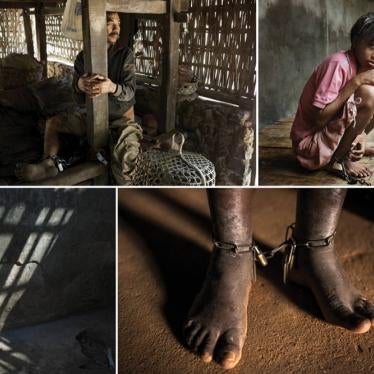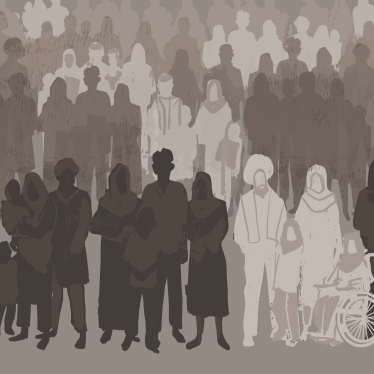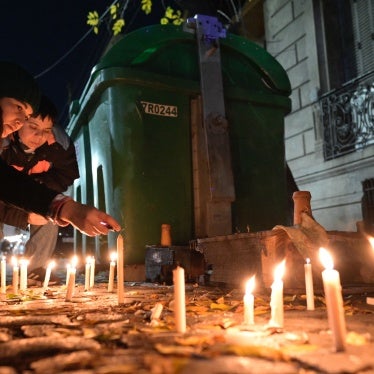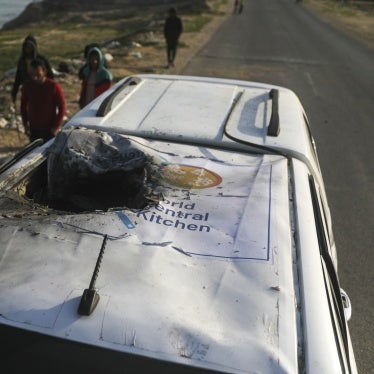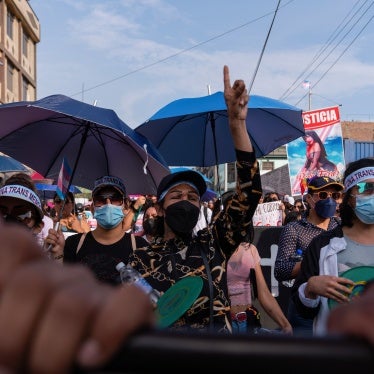April 15, 2024
H.E. Mohammed Abu Zafar
Ambassador of Bangladesh to the United Arab Emirates
Embassy of the People’s Republic of Bangladesh, Abu Dhabi
Villa No. 46,48, Sector. 19, Zone. W31
P.O. Box 2504, Abu Dhabi, United Arab Emirates
Sent via email: mission.abudhabi@mofa.gov.bd
Dear Ambassador Zafar,
Please accept my greetings on behalf of Human Rights Watch.
Human Rights Watch is an independent, nongovernmental organization that monitors and reports on human rights in more than 100 countries around the world, including Bangladesh.[1]
I am reaching out to kindly follow up on our conversation at the Bangladesh pavilion during COP28 in Dubai in December 2023.
As we discussed, in June 2023, Human Rights Watch published a report documenting the impact of unprecedented June 2022 floods in northern Bangladesh on people with disabilities and older people, including loss of lives and livelihoods, extreme hardship, and threatened human rights of at-risk populations.[2]
We interviewed 38 survivors of the floods in Sylhet and Sunamaganj and conducted 24 online video interviews with disability rights organizations, climate change experts, local officials, and aid agencies.
Among those interviewed are family members of five people with disabilities and one older person who died because they could not get medical care or faced deadly risks when trying to reach a toilet during the flooding or in its aftermath in Sunamganj. Taslima Begum, a 20-year-old woman with an intellectual disability, died in her home in Bishwamvarpur, Sunamganj, on June 27, 2022, 10 days after falling into a flooded toilet pit.
Only a few of those interviewed told us they were rescued by emergency services; most relied on their family members to survive. Those who were rescued did not have access to proper shelter. One man with a physical disability told us he had to crawl to reach a toilet since the shelter where he was staying was not accessible to people with disabilities.
Human Rights Watch documented that the flooding significantly affected the mental health of people with disabilities and older people, with many describing extreme fear, anxiety, and distress, but none had access to psychosocial services. Everyone interviewed also experienced extreme economic losses during the flooding, including loss of homes and livelihoods, which exacerbated the economic difficulties they previously faced.
Since independence in 1971, Bangladesh’s government has developed extensive disaster mitigation and response systems, which have significantly reduced casualties during flooding. We recognize the Bangladeshi government’s commitment to include people with disabilities and older people in disaster response policies, and most recently, in the national climate change adaptation plan.
Our report documents that authorities failed to implement disaster response policies during the flooding, including to deliver early warnings and adequate and accessible assistance with evacuation, shelter, health care, food, drinking water, sanitation, and hygiene[3]:
- Failure of early warning systems
Bangladesh has improved its early warning systems, but government officials did not anticipate the severity of the June 2022 floods. None of the people interviewed received warnings, leaving many to be unprepared and questioning whether to stock up on food and medicine, or to move to safe areas.
- Inadequate and inaccessible shelters
Although shelters are a key component of Bangladesh’s disaster response system, they are primarily located along the coast where cyclones are more common. People with disabilities and older people said that makeshift shelters during the 2022 floods were crowded and without adequate food, toilets, and sleeping areas. The shelters were inaccessible to people with disabilities, especially restrooms.
- Failure of humanitarian assistance
Local municipal representatives confirmed that the government’s food assistance fell short. For example, while everyone affected struggled to get drinking water and food, people with disabilities and older people faced greater problems as they could not reach these vital supplies by themselves.
We encourage your government to take action to ensure that people with disabilities and older people in Bangladesh are not left behind during humanitarian emergencies. We list recommendations in the annex to this letter.
We believe that Bangladesh could be a champion on ensuring inclusive disaster response and climate action planning in the region and globally.
We thank you for your commitment to the rights of people with disabilities and older people in Bangladesh and welcome the opportunity to further discuss with you Human Rights Watch’s research findings. Please do not hesitate to contact me via email at REDACTED or by phone at REDACTED or my colleague, Subhajit Saha at REDACTED or by phone at REDACTED.
I look forward to learning your perspectives on the situation of people with disabilities and older people experiencing extreme weather events.
Sincerely,
Emina Ćerimović
Associate Director
Disability Rights Division
Human Rights Watch
ANNEX – Recommendations to the Bangladeshi Government
- Ensure safety of people with disabilities and older people during climate-change and extreme weather induced disasters, by:
- facilitating equitable access to timely and appropriate emergency warnings and emergency services, in particular in rural and hard to reach areas.
- ensuring messaging methods, emergency preparedness, response, and recovery programs are inclusive of, and accessible to, everyone, and developed in consultations with people with all types of disabilities and older people.
- ensuring that evacuation, shelters, health care services, including mental health care, and food distribution efforts include people with disabilities and older people.
- providing targeted rehabilitation services and psychosocial support to people with disabilities, older people, and their families who have been affected by flooding and other extreme weather events, in line with Bangladesh’s National Mental Health Strategic Plan 2020-2030 and the National Plan for Disaster Management 2021-2025.
- adopting new design guidelines for accessible cyclone and flooding shelters, as described in the National Adaptation Plan, and replicating them in other shelters. People with disabilities should be consulted with and involved in the development of design guidelines.
- creating a voluntary registry for people at particular risk and developing systems to inform and support people with disabilities and older people when adapting to extreme weather events linked to climate change, in consultation with these groups.
- Ensure meaningful inclusion of people with diverse disabilities and older people in all future climate change discussions and decision making at all levels of government, including on mitigation, adaptation, and preparedness planning.
- Investigate the impact of extreme weather events on at-risk populations, including by collecting data disaggregated by age, disability, and gender, among other relevant categories.
- Provide targeted rehabilitation services and psychosocial support to people with disabilities, older people, and their families who have been affected by flooding and other weather extreme events.
- Provide regular training, designed in consultations with people with disabilities and older people, to first responders on the rights and needs of people with disabilities and older people, including communication needs.
- Establish an independent mechanism to monitor the implementation of the National Adaptation Plan, in particular commitments and actions prescribed to ensure safety of people with disabilities and older people and ensure that shortcomings are addressed promptly. The mechanism should work closely with people with disabilities, older people, and other at-risk groups, in particular those with lived experience, to ensure their views are heard and taken into account.
- Address the root causes of poverty faced by people with disabilities in Bangladesh and ensure access to social protection.
[1] To see Human Rights Watch’s reporting on Bangladesh, please see: https://www.hrw.org/asia/bangladesh.
[2] “Bangladesh: Protect People Most at Risk During Monsoon Season,” Human Rights Watch news release, June 19, 2023, https://www.hrw.org/news/2023/06/19/bangladesh-protect-people-most-risk-during-monsoon-season.
[3] Ibid.
